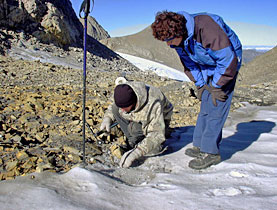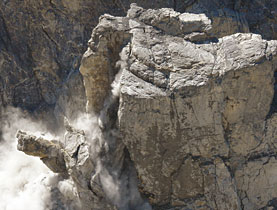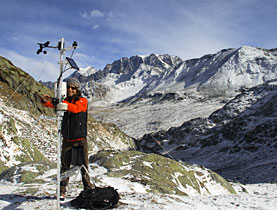Glaciers in poor regions need closer watch

Not enough attention is being paid to glacier melt in developing countries, which could eventually put at risk water supplies for hundreds of millions of people.
That was the warning issued on Monday by Swiss scientists from Zurich University in a report co-authored by the United Nations Environment Programme (Unep).
The scientists, led by Wilfried Haeberli, said monitoring of glaciers and ice caps in central Asia, tropical zones and polar regions needs to be stepped up urgently.
Haeberli, who is also director of the World Glacier Monitoring Service (WGMS), along with Peter Gilruth, Director of Unep’s Division of Early Warning and Assessment, said ice fields in these parts of the world have been largely overlooked.
They said this was a major concern given that shrinking and thinning glaciers, linked to climate change, could endanger freshwater supplies.
“Data gaps exist in some vulnerable parts of the globe undermining the ability to provide precise early warning for countries and populations at risk,” they concluded.
They called for more investment in high-tech monitoring tools for central
Asia, South America, east Africa and in Papua New Guinea.
“This requires that international glacier monitoring make use of the rapidly developing new technologies (remote sensing and geoinformatics) and relate them to the more traditional field observations, in order to face the challenges of the 21st century,” the report said.
Melting doubles
“The average annual melting rate of mountain glaciers appears to have doubled after the turn of the millennium in comparison with the already accelerated melting rates observed in the two decades before,” Haeberli said in the report.
And – the report continued – the global average annual mass loss of more than half a metre was over four times the rate of the decade from 1976 to 1985.
“The consequences of snow and ice disappearance…will be felt at local to regional scales, while the changes in the water cycle will also affect continental-scale water supply and global-scale sea levels,” Haeberli added.
If the trend continues and governments fail to agree on deep and decisive emission reductions at a key UN climate convention meeting in Copenhagen in 2009, it is possible that glaciers may completely disappear from many mountain ranges in the 21st century.
The report was issued in Geneva during the 20th anniversary celebrations of the Intergovernmental Panel on Climate Change (IPCC) – the scientific body established by Unep and the World Meteorological Organization to advise governments on global warming.
swissinfo with agencies
Glaciers around the globe have been shrinking significantly since the second half of the 19th century, according to the Swiss-based World Glacier Monitoring Service.
It said there were strong glacier retreats in the 1940s, stable or growing conditions around the 1970s, and again increasing rates of ice loss since the mid 1980s.
Under current climate scenarios presented by the IPCC, the ongoing trend of worldwide and rapid, if not accelerating, glacier shrinkage…may lead to the deglaciation of large parts of many mountain ranges by the end of the 21st century.
Worldwide glacier monitoring was initiated in 1894 in Switzerland. It was hoped that long-term glacier observations would give insight into processes of climatic change such as the formation of ice ages.
In 1986 the WGMS continued the collection of information on ongoing glacier changes, taking over the work of two former services.
Today, it collects standardised observations on changes in mass, volume, area and length of glaciers with time (glacier fluctuations), as well as statistical information on the distribution of perennial surface ice in space (glacier inventories).
Such glacier fluctuation and inventory data are high priority, key variables in climate system monitoring. The highest information density is found for the Alps and Scandinavia, where long and uninterrupted records are available.

In compliance with the JTI standards
More: SWI swissinfo.ch certified by the Journalism Trust Initiative











You can find an overview of ongoing debates with our journalists here . Please join us!
If you want to start a conversation about a topic raised in this article or want to report factual errors, email us at english@swissinfo.ch.